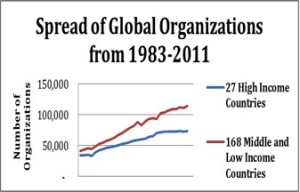Citizen engagement is essential for democracy, but an increasing number of regulatory policies are formulated by international organizations beyond the reach of established national democratic processes. For example, member nations negotiate agreements regulating investments through the Organization for Economic Cooperation and Development. These rules may seem technical, but they directly affect ordinary people through their insurance plans, pension plans, and savings accounts.
Even when the nations involved are themselves democracies, international regulation increases the distance between the decision-makers and those regulated. Often with no more than a few clicks on computer keyboards, Americans and citizens of other advanced democracies can easily contact their representatives in Congress or various parliaments. But contacting a national minister serving on the Organization for Economic Cooperation and Development takes more effort. Even well-informed citizens are unlikely to know where to begin.
Campaigns or organizations that operate across national boundaries – collective efforts that together create a global civil society – offer a way to bridge this democratic gap. Such campaigns or associations can increase popular awareness of what is at stake in international negotiations, and they can combine efforts from disparate constituents to deliver a unified message to international negotiators. A good example is the far-reaching 1997 campaign mounted largely through the Internet to register opposition from many nations to the closed-door negotiations at the Organization for Economic Cooperation and Development that aimed to hammer out the Multilateral Agreement on Investment. That agreement was ultimately set aside after many associations and nonprofit groups raised concerns that it could undercut labor and environmental standards in many countries. This pioneering campaign demonstrated the potential of globally operating civil society campaigns to promote and coordinate transnational political participation.The Changing Landscape of Global Civil Society
Possibilities for expanded participation through transnational civic efforts depend on several factors – the global reach of such efforts, their degree of democratization, and their effectiveness in communicating information to concerned citizens in various nations.
At first glance, the picture seems discouraging, because global civil society tends to be centered in wealthy countries. In 2011, 39% of all globally oriented civil society organizations operated in twenty-seven high-income countries – in western European nations and in Canada, the United States, Japan, Australia, and New Zealand. But things are changing, because the wealthy nations claimed 45% of such globally oriented civic associations back in 1983.
In recent decades, global civic organizations have proliferated more rapidly in middle- and low-income countries, for several important reasons:
- As nations adopt multilateral treaties, additional transnational civic organizations start operating within their boundaries. International cooperation stimulates the growth of global civil society.
- Countries that make transitions to more democratic forms of national governance become home to additional global civil society organizations. As citizens gain experience with active democratic participation, they take part in global as well as national efforts.
- Global civic efforts make gains along with popular access to the Internet and other advanced communication technologies. Global campaigns and civic associations benefit from the free flow of information, which is essential to overcoming barriers to political participation.
The Democratizing Potential of Global Civic Campaigns
Although global democracy remains in its infancy, the campaign launched in the late 1990s to stop the Multilateral Agreement on Investment illustrates the potentials.
The effort to contest Multilateral Agreement on Investment negotiations started two years after the Organization for Economic Development and Cooperation expanded to include newly independent nations in Eastern Europe. These new member countries were either rediscovering democratic traditions or developing democratic arrangements for the first time, and many people in these countries were skeptical of the liberal economic ideas that held sway in advanced countries. Newly activated citizens in developing democracies injected a wider range of opinions into the negotiations.
Like subsequent global campaigns, the mobilization against the Multilateral Agreement on Investment was not a single action; it was a coordination of thousands of smaller efforts through the Internet. Sparked by leaks about draft regulations being discussed in closed-door elite sessions, mobilizations were coordinated across national boundaries and led to massive protests at the World Trade Organization’s 1999 meeting in Seattle. These protests were a coming out party for a global social movement that has since grown and spread – a movement that activates citizens in many nations to push back against undemocratic forms of international governance
—
Read more in Barbara J. Hosto-Marti, “Globalization and the Growth of International Nongovernmental Organizations and Global Governance,” PhD dissertation, University of Missouri-St. Louis, forthcoming.


 Research to Improve Policy: The Scholars Strategy Network seeks to improve public policy and strengthen democracy by organizing scholars working in America's colleges and universities. SSN's founding director is Theda Skocpol, Victor S. Thomas Professor of Government and Sociology at Harvard University.
Research to Improve Policy: The Scholars Strategy Network seeks to improve public policy and strengthen democracy by organizing scholars working in America's colleges and universities. SSN's founding director is Theda Skocpol, Victor S. Thomas Professor of Government and Sociology at Harvard University.
Comments 1
International Law Colloquium Commemorating Wedding of Launch of Five Concepts of Relaxing co existence Successfully Used in Beijing - iForeignAffairs — June 5, 2014
[…] the historic efforts of the Five Concepts whilst the basic principles for global relationships and international regulation, analysed and described the associations of the Five Concepts within the occasions, and positively […]